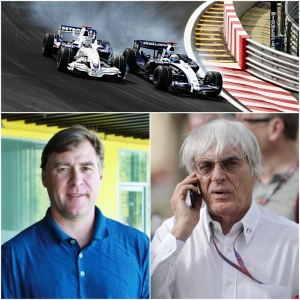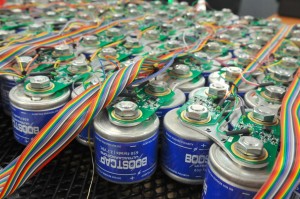
Bernie Ecclestone and Prof Keith Stevenson agree that electric cars have growing importance. But they disagree on when and how this revolution should be implemented
What links fast cars, fast charging batteries and one of the fastest growing universities in Russia? A debate surrounding the implementation of new and cleaner energy technologies. On one hand of the divide is Bernie Ecclestone, the reigning emperor of the F1 kingdom. On the other, Keith Stevenson, electrochemical energy expert and head of a Skoltech research center.
Global attention turns to Sochi as Russia hosts its first Formula One Grand Prix this weekend. For millions of fans, the world’s biggest race is a celebration of speed, human ambition – and technology. While racing at a new venue puts fuel consumption on center stage, it also highlights a clean-tech component: hybrid power units utilizing high performance batteries.
Prof Keith Stevenson, director of the Skoltech center for Electrochemical Energy Storage is directly involved in an ambitious effort to translate cutting edge technology from one-of-a-kind race cars to every vehicle in the world – and lessen our dependence on oil.
Stevenson points out that fast-charging batteries are a critical part of any winning F1 team’s strategy. Every time a star driver like Lewis Hamilton or Sebastian Vettel presses the accelerator and speeds up, waste heat is converted into electrochemical energy and the battery is charged. Energy from the battery can then be used to power a motor generator unit which is connected to the car’s engine – and boost the speed. When drivers hit the brakes, the batteries are recharged in a matter of milliseconds.
In the eyes of many race fans and any chemistry buff, these so called Ultracapacitors or Pseudocapacitors are high tech facilitators of speed. They draw gasps from a crowd. Batteries are thrilling. Prof Stevenson believes they are much more than that.
“These batteries are the basis of ‘start-stop’ technology installed in most cars currently manufactured by GM and others”, he says. “They are used to start hybrids when coming to a stop, like at red light, and then restart the engine when the light goes green. So these are real performance tech applications that are already increasingly commercialized in new cars.”
Will all this transform the auto industry in the immediate future? Skeptics abound, first and foremost within the racing community. Bernie Ecclestone, the chief executive of the Formula One Group acknowledges that “I do realize that electric cars are in a way the future of the automobile industry. It’s the next step.”
However, the legendary and controversial British racing magnate points out that “today on the F1 pit-lanes we can’t use electric cars in full swing. You know, they produce no noise, you can’t hear those cars and if they are soundless vehicles. This can even lead to victims on the pit-lanes. Electric cars are convenient and even comfortable. So is dancing ballet in sneakers. It is not realistic” he quips.

‘ Ultracapacitor ‘ batteries could be installed in every car in the next few years, says Skoltech professor Keith Stevenson. Image courtesy of Argonne National Laboratory
Yet Stevenson is unfazed by this classic example of Ecclestonish. In the view of the sceintist who heads one of the 15 Skoltech Centers for Research Education and Innovation (CREIs), the next phase of research would focus on making energy storage units more compact and increase their energy density. Much like a smartphone or a laptop, eco-friendly cars can be fast, light and cheap. In order to achieve that, the scientist who had spent 14 years at the University of Texas at Austin before recently moving to Moscow, works with teams of international researchers. In his view, extensive international collaboration is key.
“The actual materials that make all that possible involve a company called A123, that got recently sold to a firm in China. The co-founder of A123 is MIT professor Yet-Ming Chiang, who is a member of the Skoltech MIT partnership. Myself and Moscow State University researchers are also working on several material developments in this area of Fuel and Electrolysis Cells for Efficient Energy Conversion and Storage. We are going to lessen dependence on oil, because we must. But we are still going to enjoy driving.”
Apart from establishing the Electrochemical Energy Storage center as a powerhouse of innovative alternative and cost effective research to store and utilize energy, do you like the F1 race itself?
“Yes. I will be watching the Sochi race. Would like to see Daniil Kvyat do well as he is an up and coming young Russian driver”.
* The Skolkovo Institute of Science and Technology (Skoltech) is a private graduate research university in Skolkovo, Russia, a suburb of Moscow. Established in 2011 in collaboration with MIT, Skoltech educates global leaders in innovation, advances scientific knowledge, and fosters new technologies to address critical issues facing Russia and the world. Applying international research and educational models, the university integrates the best Russian scientific traditions with twenty-first century entrepreneurship and innovation.
